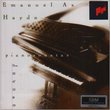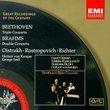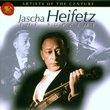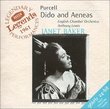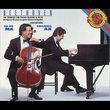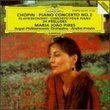| All Artists: Peter Mattei, Gustav Mahler, Riccardo Chailly, Royal Concertgebouw Orchestra, Anne Schwanewilms, Jane Eaglen, Ruth Ziesak, Ben Heppner Title: Mahler 8 Members Wishing: 0 Total Copies: 1 Label: Decca Import Release Date: 3/13/2001 Album Type: Import Genre: Classical Style: Symphonies Number of Discs: 2 SwapaCD Credits: 2 UPC: 028946731420 |
Search - Peter Mattei, Gustav Mahler, Riccardo Chailly :: Mahler 8
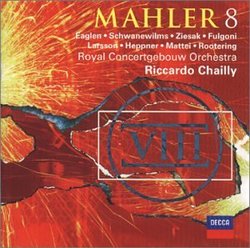 | Peter Mattei, Gustav Mahler, Riccardo Chailly Mahler 8 Genre: Classical
With this stunningly recorded account of Mahler's Symphony No.8, Riccardo Chailly and his Concertgebouw forces provide a clear modern recommendation for this gigantic piece. Chailly's strength lies in his ability for long-... more » ![header=[] body=[This CD is available to be requested as disc only.]](/images/attributes/disc.png?v=a4e11020) ![header=[] body=[This CD is unavailable to be requested with the disc and back insert at this time.]](/images/attributes/greyed_disc_back.png?v=a4e11020) ![header=[] body=[This CD is unavailable to be requested with the disc and front insert at this time.]](/images/attributes/greyed_disc_front.png?v=a4e11020) ![header=[] body=[This CD is unavailable to be requested with the disc, front and back inserts at this time.]](/images/attributes/greyed_disc_front_back.png?v=a4e11020) |
Larger Image |
CD DetailsSynopsis
Amazon.com With this stunningly recorded account of Mahler's Symphony No.8, Riccardo Chailly and his Concertgebouw forces provide a clear modern recommendation for this gigantic piece. Chailly's strength lies in his ability for long-range thought, and he projects Mahler's vast canvas with the utmost clarity and conviction. The impressive opening is taken broadly and expansively; one is aware of the import of the journey that follows. Throughout the performance, Chailly's clear analytical approach to texture and musical flow serves only to accentuate the text and its meaning. This means, for example, that the final reappearance of the opening cry of "Veni Creator spiritus" can be truly climactic. Perhaps Chailly is at his most successful in the long second movement. He keeps the extended opening section at a slight remove, so that the disembodied, fragmentary world he creates reflects the scale of the experience to come. For once, the vocal soloists make for a well-integrated team. For the Mahler collector, this issue will ideally complement Horenstein, Solti, Kubelík, and the ever-impressive Tennstedt. As a bonus, Mahler scholar Donald Mitchell's booklet notes are authoritative and thought-provoking. --Colin Clarke Similar CDs
Similarly Requested CDs |
CD ReviewsI have been to the mountain NotATameLion | Michigan | 09/10/2003 (5 out of 5 stars) "Well here it is. This recording is proof that all the good things I have ever heard people say about Mahler's 8th are indeed true.I have always loved Mahler. He is in fact my favorite composer. I love all of his other symphonies. Yet this symphony--supposedly his grandest musical statement of all--has continually left me cold.I have tried Solti. I've checked out Abbado (whose 5th is still my favorite and whose first recording of the 7th is mighty fine). I even went to Tennstedt (who conducted a VERY good 1st). I just wasn't moved. But now, thanks to Maestro Chailly, his old outfit in Amsterdam and four BLAZING choirs...I have seen the light!!!This recording of Mahler's 8th grips you from the first moment. It can blow you away. It can overwhelm you with its lyricism and beauty. The best compliment I have to give is to say that this recording is Mahlerian in the very best sense.Perfect love casts out fear. Don't be afraid to try this recording. You will love it even if you've never enjoyed the 8th or listened to Mahler before." Surprising intimacy Bruce Hodges | New York, NY | 06/14/2002 (5 out of 5 stars) "This massive work is Mahler at his most extravagant, requiring a huge orchestra, chorus, children's choir and eight vocal soloists. I have a number of recordings, including memorable ones by Sinopoli, Haitink, Solti and Abbado, among others, but this new one is superb. For one, this piece absolutely begs for demonstration-quality sound, and on that criterion alone this disc succeeds triumphantly. From the thundering opening which includes the Concertgebouw's magnificent pipe organ, you know you are in for a spectacular sonic experience, and Decca's engineers deserve the warmest congratulations. It is Chailly, however, whose natural dramatic instincts serve him so well, in this most "operatic" of all of Mahler's works. Interestingly, he proceeds at a fairly deliberate pace from the outset, as opposed to say, Solti, whose Eighth is beautifully played by the Chicago Symphony Orchestra but much more driven. I was startled initially by Chailly's tempo, but with each hearing, his concepts seem to make more and more sense. Mahler's orchestration is complex, and this deliberate, majestic approach reveals every bit of the textures and counterpoint - and as someone else noted, only increases the work's cumulative power. The ending of Part One, with the combined orchestral and vocal forces at full blast, is pretty jaw-dropping.Part Two opens with an orchestral interlude, and the playing here is just exquisite. The movement proceeds through gorgeous set pieces for the vocalists (all excellent), not to mention the charming contribution of the children's choir. The chorus is also outstanding, and the orchestra - let's face it - is incomparable in this score. Mahler demands extreme brilliance from every single musician, and this is a group that seemingly accepts the challenge with pleasure, melding virtuosity with the work's heart-on-sleeve emotional content. The closing pages, especially the celestial final measures, may have you reaching for a handkerchief - while simultaneously checking that your ceiling is still intact.Like one of the reviewers below, I was also in the audience for two performances of the Eighth, live in the Concertgebouw. However, for me this CD does duplicate the magic of those experiences. But that said, almost any recording of the Eighth cannot match the power of hearing it live, and therefore, a certain disappointment may be almost a given. I find Chailly's somewhat unconventional approach to Mahler invigorating, though some may prefer the impact and momentum offered by someone like Solti. But if other versions have left you cold, this one is well worth hearing. Just do your neighbors a favor and make sure they're out for the evening." A very idiomatic performance:sort of Brucknerian feel to it David A. Hollingsworth | Washington, DC USA | 06/11/2001 (5 out of 5 stars) "Imagine for a moment sitting in a huge cathedral, with its immense structure and majesty so overwhelming and stunning that you feel that you've experience something entirely new: that something you cannot put into words, but the feeling that has a certain magic, mystery, and grandeur as if God is at presence, as if you're in a deep divine journey soul searching and in the end, finding that answer. Riccardo Chailly's recording of Mahler's Eighth Symphony is that journey. The thing I like much about Chailly is that he avoided the immense intensive drive of Bernstein and instead, much like Horenstein, treated the work as if he was performing Bruckner. And I said Bruckner, for Chailly tempi in Part I has that Brucknerian feel to it, with the pacing deliberately spacious and grandeur with a certain nobility that Bruckner himself would rise up and say "Halleluja!" Admittedly, that may not be the taste of many and Mahler would have probably wish a greater sense of urgency and emotional drive. But this performance is of upmost clarity and precision and from start to finish in Part I, I sense that devine something rising and take a strong hold of me, and even listening to Part II, Chailly's interpretation of Part I never left my mind. This is visionary in the truest sense.Part II is likewise spellbinding and admittedly a more Mahlerian feel to it. The poco adagio is nicely restrained and mysterious as in Bernstein's. As Part II moves on, the music sounds more wonderfully alive and spritual, with the boys singing with playfulness and innocence and the soloists and choir sounding so vibrant and yet so concentrated. The pace continues to flow to an absolute flawlessness and there could never be a more powerful, visionary-like ending as if Moses raised his hands to the sky after reaching the mountain top. Chailly and his forces truly made this symphony a resurrection of its own. The Royal Concertgebouw Orchestra of Amsterdam proved to be among the best Mahler orchestra. Nothing bland could be said of its performance. Every player sound as if he/she had went through something special, something visionary that cannot be placed into words but that something each player would like to experience again. This is truly an affinity to the music Mahler himself strove for during his life. The Boys Choir sound magnificently and amazingly real while the choirs of the Prague Philharmonic and the Netherlands Radio sang with such a wonderful radiance. The soloists, including Ben Heppner as Doctor Marianus and Anne Schwanewilms in Una Poenitentium, treated the work like a deep, soul searching journey, not as a theatrical drama. They did not exaggerate this momentus masterpiece: instead, they, with Chailly and his orchestra, upheld a unique meaning behind the music, revealing to those willing to go deep into one's conscious. Just one question though: who is the organist for this recording? A crying shame that his/her name is not mentioned anywhere in this CD album. I would not necessarily place this recording over Bernstein's with the Vienna Philharmonic, Horenstein's with the London Symphony, or Solti's with the Chicago Symphony. Their insights to the music are visionary and authentic, impulsive and energetic, as the Symphony truly demands. But, like Sinopoli and the Philharmonia, Chailly offers his version of the score that, although calculated, is something truly on the mountain top in a whole, unifying, and idiomatic self."
|

 Track Listings (6) - Disc #1
Track Listings (6) - Disc #1

